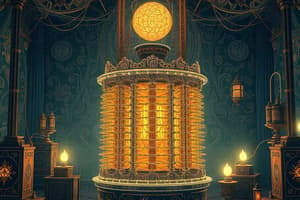Podcast
Questions and Answers
What is the fixed part of an induction motor?
What is the fixed part of an induction motor?
- None
- Both
- Rotor
- Stator (correct)
Which type of rotor winding is similar to the winding on the stator?
Which type of rotor winding is similar to the winding on the stator?
- Squirrel-cage winding
- Wound rotor (correct)
- Single-phase winding
- Conventional 3-phase winding
Which of the following is a characteristic of three-phase induction motors?
Which of the following is a characteristic of three-phase induction motors?
- They require constant frequency for operation
- They are low-cost and easy to maintain (correct)
- Variable speed control is easy to achieve
- They run at variable speed from no-load to full load
What type of magnetic field does the stator of a 3-phase induction motor produce?
What type of magnetic field does the stator of a 3-phase induction motor produce?
Which component is essential for the induction motor to maintain a fixed speed?
Which component is essential for the induction motor to maintain a fixed speed?
What is the purpose of slots in the stator core of an induction motor?
What is the purpose of slots in the stator core of an induction motor?
What happens to the flux lines on the left side of a conductor placed in a magnetic field when the current flows in an anti-clockwise direction?
What happens to the flux lines on the left side of a conductor placed in a magnetic field when the current flows in an anti-clockwise direction?
According to Fleming's left hand rule, how is the direction of force on a conductor determined?
According to Fleming's left hand rule, how is the direction of force on a conductor determined?
What determines the speed of a three-phase induction motor?
What determines the speed of a three-phase induction motor?
Which of the following machines frequently utilizes induction motors?
Which of the following machines frequently utilizes induction motors?
What is the formula representing the magnitude of force experienced by a current carrying conductor in a magnetic field?
What is the formula representing the magnitude of force experienced by a current carrying conductor in a magnetic field?
What does the thumb represent in Fleming's left hand rule?
What does the thumb represent in Fleming's left hand rule?
What is the primary role of the armature winding in a DC motor?
What is the primary role of the armature winding in a DC motor?
When the fields from the conductor and magnet strengthen each other, what happens to the flux lines?
When the fields from the conductor and magnet strengthen each other, what happens to the flux lines?
Which factor does NOT affect the magnitude of force on a current-carrying conductor in a magnetic field?
Which factor does NOT affect the magnitude of force on a current-carrying conductor in a magnetic field?
What is the relationship between the direction of magnetic field and current regarding the force experienced by a conductor, as described by Fleming’s left hand rule?
What is the relationship between the direction of magnetic field and current regarding the force experienced by a conductor, as described by Fleming’s left hand rule?
What is the purpose of laminating the armature core in a DC machine?
What is the purpose of laminating the armature core in a DC machine?
Which type of armature winding ensures that all slots are filled?
Which type of armature winding ensures that all slots are filled?
What material is commonly used for constructing brushes in small DC machines?
What material is commonly used for constructing brushes in small DC machines?
What is the effect of circulating current in lap winding?
What is the effect of circulating current in lap winding?
Which component of a DC machine is responsible for converting AC voltage to DC voltage?
Which component of a DC machine is responsible for converting AC voltage to DC voltage?
Why are dummy coils used in wave winding?
Why are dummy coils used in wave winding?
What material is NOT typically used for brushes in large DC machines?
What material is NOT typically used for brushes in large DC machines?
What device is used to start and accelerate a DC motor?
What device is used to start and accelerate a DC motor?
What is the primary function of a transformer?
What is the primary function of a transformer?
What occurs when a transformer is connected to a DC supply?
What occurs when a transformer is connected to a DC supply?
Which type of transformer is used primarily for high voltage power transfer applications?
Which type of transformer is used primarily for high voltage power transfer applications?
What is a key feature of an auto-transformer?
What is a key feature of an auto-transformer?
In what applications are measurement transformers used?
In what applications are measurement transformers used?
What does the turns ratio (TR) of a transformer determine?
What does the turns ratio (TR) of a transformer determine?
What type of transformer is used to provide isolation between two circuits?
What type of transformer is used to provide isolation between two circuits?
What is NOT a common application of transformers?
What is NOT a common application of transformers?
What is a major disadvantage of DC motors in low-pressure environments?
What is a major disadvantage of DC motors in low-pressure environments?
What is the primary role of a starter in a DC motor?
What is the primary role of a starter in a DC motor?
How can the speed of a DC motor be controlled?
How can the speed of a DC motor be controlled?
Why do DC motors require additional resistance at startup?
Why do DC motors require additional resistance at startup?
What happens to the current drawn by a DC motor at startup without a starter?
What happens to the current drawn by a DC motor at startup without a starter?
What factors can influence the speed of a DC motor?
What factors can influence the speed of a DC motor?
Which of these is NOT a reason DC motors might not be used in explosive environments?
Which of these is NOT a reason DC motors might not be used in explosive environments?
How does the presence of back emf affect the operation of a DC motor?
How does the presence of back emf affect the operation of a DC motor?
Study Notes
Natural and Forced Circulation
- In natural circulation, hot oil rises while cold oil sinks, enabling natural circulation through tubes.
- Forced circulation involves an external pump to circulate oil.
Transformer Basics
- Transformers operate based on turns ratio (TR), defined as the number of turns in the primary coil divided by those in the secondary coil.
- TR influences transformer operation and the voltage available on the secondary winding.
Transformers and DC Supply
- Transformers do not function with DC supply due to zero rate of flux change.
Applications of Transformers
- Used for stepping up and stepping down voltage.
- Provides isolation between circuits and aids in impedance matching.
- Utilized for measuring high current and voltage with current transformers and potential transformers.
- Common in electrical transmission and distribution systems, rectifier circuits, voltage regulators, and power stabilizers.
Transformer Classification
- Power Transformers: Handle high voltage power transfer over 33 KV, larger in size.
- Distribution Transformers: Distribute power at low voltages (less than 33 KV for industrial, 220-440 V for households).
- Measurement Transformers: Aid in the measurement of voltage, current, and power.
Auto-Transformer
- An auto-transformer has only one winding, allowing self-operation rather than automatic mechanisms.
Principle of Operation of DC Motors
- A current-carrying conductor in a magnetic field experiences a force, essential for motor function.
- Force magnitude calculated as F = BIl, where B is flux density, I is current, and l is conductor length.
- The force direction follows Fleming's left-hand rule, with fingers indicating direction of field, current, and force.
Armature and Winding in DC Motors
- Armature is the part where voltage is induced, consisting of laminated silicon steel core to minimize eddy current losses.
- Two types of armature windings:
- Lap winding: All slots filled.
- Wave winding: Some slots left empty and filled with dummy coils for mechanical balance.
Commutator and Brush Functionality
- Commutator converts AC to DC voltage and ensures unidirectional torque.
- Brushes made from copper or carbon facilitate current transfer to armature conductors, with variations for size and voltage.
Starting of DC Motors
- Starters reduce initial high current to protect the motor from damage due to low resistance and lack of back EMF at startup.
- Necessary for controlling starting current, especially in large motors.
Speed Control of DC Motors
- Speed adjustable through changes in field current, applied voltage, or resistance in series with armature.
- Speed governed by the equation N ∞ Eb/φ, with Eb representing back EMF and φ representing flux.
Induction Motors
- Three-phase induction motors are prevalent in industries for their simple design and maintenance.
- Operate at a nearly constant speed from no-load to full load, speed determined by the frequency of the power source.
- Variable speed control requires variable-frequency drives.
Induction Motor Construction
- Consists of stationary stator, with a hollow, cylindrical core, and a revolving rotor with laminated punched slots for winding.
- Rotor types: wound rotor (wears similar to stator winding) and squirrel-cage (using aluminum bus bars).
Rotating Magnetic Field
- Stator produces a balanced three-phase magnetic field displaced by 120 degrees, facilitating the generation of a rotating magnetic field.
- The formula for rotor speed is determined by the supply frequency and number of poles.
Studying That Suits You
Use AI to generate personalized quizzes and flashcards to suit your learning preferences.
Related Documents
Description
Explore the principles of natural and forced circulation in transformers. This quiz delves into the behavior of oil in cooling systems and the transformation ratio between primary and secondary coils. Test your understanding of these vital concepts in electrical engineering.




